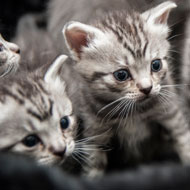
Unplanned litters could result in millions of unwanted kittens
The UK could be set for a 'population explosion’ of cats after more than 850,000 felines had unplanned litters last year, research by the PDSA reveals.
The animal welfare charity says that the unplanned litters could add up to as many as 4.3 million potentially unwanted kittens.
Just 15 per cent of cat owners whose animals had kittens had actually planned for the litters. Yet the unwanted kittens could have been avoided if owners had their pets neutered.
Now a group of animal welfare charities, which make up the Cat Population Control Group (CPCG), have launched World Spay Day to encourage more owners to get their cats neutered.
They believe that many owners are unprepared for the cost and commitment of raising kittens and struggle to fund them suitable homes.
Nicola Martin, head of pet health & welfare at PDSA, said: “Our research has shown that unprepared cat owners are putting themselves in an unnecessary and potentially challenging position by not getting their cats neutered.
“The impact of this can be both costly and stressful if a cat becomes pregnant as it can be very difficult to find loving new homes for large numbers of kittens. As a result, we know that sadly many cats end up in rehoming and rescue centres.”
According to PDSA’s Animal Wellbeing (PAW) Report, nearly a quarter of cat owners whose cat has not been neutered said their felines had not been neutered because they “hadn’t thought about it”.
Other top reasons for not getting the procedure done included simply not getting around to it and that it was too expensive.
Nicola added: “Neutering has numerous health benefits for your cat and is, in fact not as expensive as many people think. By getting your cat neutered, not only will you be avoiding the risk of an unwanted or unplanned pregnancy but you will be reducing their risk of contracting diseases such as cancer or FIV – the feline equivalent of HIV.
“Many pet owners also believe that neutering should take place when their cat is around six-months-old but our advice is that for maximum health and welfare benefits, it should take place from four months of age.”
In addition to World Spay Day, the PDSA also hope to educate more owners about the benefits of neutering through a team of Pet Wellbeing Champions in PDSA’s Pet Hospitals.



 The latest
The latest